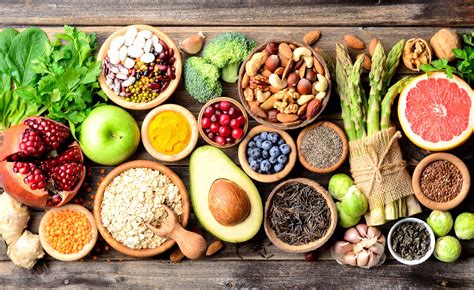Discover the benefits of superfoods and how to incorporate them into your diet. Learn about different types and potential risks.
Understanding Superfoods
Contents
When we hear the term superfoods, we often think of nutrient-dense foods that offer a wide range of health benefits. These foods are typically rich in vitamins, minerals, antioxidants, and other essential nutrients that can help support overall well-being. Some examples of common superfoods include berries, kale, quinoa, and fatty fish like salmon and mackerel.
One of the key characteristics of superfoods is their high concentration of antioxidants, which are compounds that help protect the body from damage caused by free radicals. Free radicals are unstable molecules that can contribute to aging and various chronic diseases. By consuming superfoods that are rich in antioxidants, individuals may be able to reduce their risk of developing certain health conditions.
Another important aspect of superfoods is their potential to promote heart health. Many superfoods are known for their ability to lower cholesterol levels, reduce inflammation, and improve blood circulation. For example, foods like avocados, nuts, and olive oil are all recognized for their cardiovascular benefits, making them valuable additions to a heart-healthy diet.
It’s important to note that while superfoods can offer numerous health advantages, they should be consumed as part of a balanced diet that includes a variety of nutrient-rich foods. Relying solely on superfoods without incorporating other essential nutrients can lead to nutritional deficiencies and imbalances. As such, individuals should aim to incorporate superfoods into their diet in conjunction with a wide range of fruits, vegetables, whole grains, and lean proteins.
Benefits of Superfood Diet
Superfoods are nutrient-rich foods that are considered to be especially beneficial for health and well-being. Incorporating these superfoods into your diet can offer a wide range of benefits for your body and mind. One of the main advantages of a superfood diet is the potential to improve overall health and prevent chronic diseases.
Eating a variety of superfoods can provide essential vitamins, minerals, and antioxidants that support a strong immune system and reduce the risk of developing conditions such as heart disease, diabetes, and cancer. These powerful nutrients can also lower inflammation in the body, promote healthy digestion, and enhance cognitive function.
Another key benefit of a superfood diet is the positive impact it can have on energy levels and weight management. Many superfoods are low in calories but high in nutrients, making them an ideal choice for those looking to maintain a healthy weight or support weight loss goals. Additionally, the nutrient density of superfoods can help to sustain energy levels throughout the day, reducing the likelihood of energy crashes and fatigue.
In addition, the inclusion of superfoods in your diet can contribute to improved skin health and a youthful appearance. The vitamins and antioxidants found in many superfoods can help to protect the skin from damage caused by environmental factors and promote a radiant complexion. Overall, a superfood diet can offer numerous benefits for physical and mental well-being, making it a valuable addition to a healthy lifestyle.
Types of Superfoods
When it comes to superfoods, there are a wide variety of options to choose from. One popular type of superfood is berries, such as blueberries, strawberries, and raspberries. These fruits are packed with antioxidants, vitamins, and minerals, making them a great addition to any diet. Another type of superfood is leafy greens, like spinach, kale, and Swiss chard. These vegetables are high in nutrients like iron, calcium, and fiber, and are known for their numerous health benefits.
Additionally, nuts and seeds are considered superfoods, as they are rich in healthy fats, protein, and essential vitamins and minerals. Examples of superfood nuts and seeds include almonds, walnuts, chia seeds, and flaxseeds. These foods can help reduce the risk of heart disease, support brain health, and promote overall well-being.
Whole grains are another important category of superfoods, as they are a great source of fiber, B vitamins, and other nutrients. Quinoa, brown rice, and oats are all examples of superfood grains that can be incorporated into a healthy diet for improved energy levels and digestive health. Lastly, fatty fish like salmon, sardines, and mackerel are considered superfoods due to their high omega-3 fatty acid content, which can help lower the risk of heart disease and improve brain function.
Incorporating Superfoods into Your Diet
When it comes to incorporating superfoods into your diet, it’s important to understand the significance of these nutrient-packed foods. One of the key benefits of superfoods is that they are densely packed with essential vitamins, minerals, and antioxidants, offering a wide range of health benefits.
By including superfoods in your daily meals, you can boost your immune system, improve your overall well-being, and reduce the risk of chronic diseases. Some common types of superfoods include berries, leafy greens, nuts, seeds, and fatty fish, just to name a few.
One effective way of incorporating superfoods into your diet is by incorporating them into your favorite recipes. You can add berries to your morning oatmeal, toss leafy greens into your salads, sprinkle nuts and seeds onto your yogurt, and grill fatty fish for a delicious dinner.
Furthermore, you can create a meal plan that includes a variety of superfoods throughout the week. This will help you ensure that you are getting a diverse range of nutrients from different sources, maximizing the health benefits of your diet.
However, it’s important to keep in mind that while superfoods offer many benefits, it’s essential to maintain a balanced and varied diet. This means not relying solely on superfoods, but rather incorporating them as a part of a well-rounded and nutritious eating plan.
Potential Risks and Considerations
When considering a superfood diet, it is important to be aware of the potential risks and considerations that come with it. While incorporating superfoods into your diet can offer numerous health benefits, it is essential to approach this diet with caution and awareness. One potential risk to consider is the potential for nutrient imbalances. While certain superfoods may be rich in specific nutrients, relying too heavily on these foods can lead to an imbalance in other essential vitamins and minerals. It is important to ensure a diverse and well-rounded diet to avoid any potential deficiencies.
Incorporating superfoods into your diet may also come with considerations related to food allergies and sensitivities. Some individuals may have allergies to specific superfoods, such as nuts, seeds, or certain fruits. It is crucial to be mindful of any allergies or sensitivities that you or your family members may have before introducing new superfoods into your diet. Additionally, some superfoods may interact with certain medications or medical conditions, so it is essential to consult with a healthcare professional before making significant changes to your diet.
Another important consideration when following a superfood diet is the potential for increased costs. Superfoods, particularly exotic or rare varieties, can be more expensive than traditional foods. For individuals on a budget, incorporating superfoods into their diet may not be financially feasible. It is important to weigh the potential costs and benefits when deciding whether to include superfoods in your diet and to explore more affordable options.
Finally, it is crucial to be mindful of the potential for misleading marketing and misinformation surrounding superfoods. Not all foods labeled as superfoods live up to the hype, and it is essential to critically evaluate the nutritional value and health claims of these foods. Being an informed consumer and seeking out credible sources of information can help you make more informed decisions about which superfoods to incorporate into your diet.












